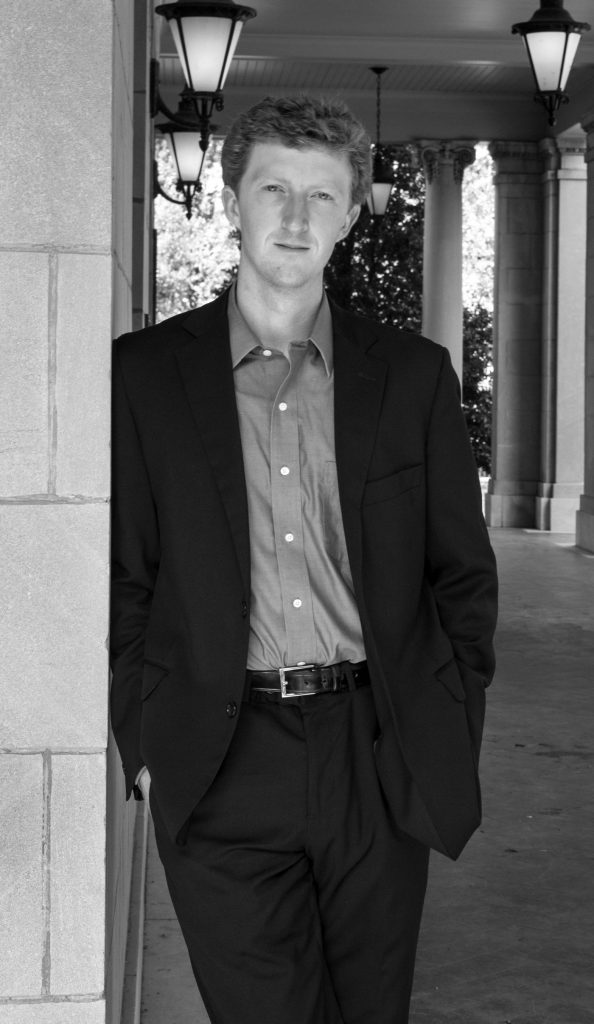‘The principles of good craft apply as much to poems as to porches’
Meet Benjamin Morris — a Life Member of Clare Hall who today works as a poet, writer, researcher, and carpenter

Currently I have several manuscripts underway.
One is a full-length poetry collection called The Singing River, which has come perilously close to being published several times in the past few years, so I’m hoping that means I’m on the right track. The peril continues. Day-to-day, though, I’m revising a novel set in the 1970s, about a pastor who moves to rural Alabama to take a post, and who ends up struggling not only with his flock but also with his faith. As a novelist (and as a parishioner myself) I’m interested in the internal conflicts that clergy face — conflicts that rarely make the news but which for sincere, devoted shepherds can be truly life-altering. I’m on the sixth draft and will be sending it back out soon.
On good days, my routine involves reading and writing in the morning until lunch.
In the afternoon, I switch gears. Since returning to the States I’ve trained as a carpenter, so I often work on building projects to let my mind rest a bit from manuscripts — and because there’s such pleasure in woodworking and physical trades (the principles of good craft apply as much to poems as to porches). After dinner I do a bit of light editing or correspondence before winding down. Academically, I’m not actively teaching at the moment, but I do continue to edit research manuscripts and serve as a peer-reviewer when asked.
New Orleans is, hands-down, one of the world’s great cities for the arts, but as is often the case, not all art forms are equally represented.
Several years ago, the poets in town realised that we had many different literary and book festivals, but none dedicated just to poetry — hence the NOPF was born. We’re a loose collective of organisers (anyone can volunteer) whose mission is simple: to showcase the rich poetic talent here in New Orleans and Louisiana to the rest of the country and, conversely, to bring in poets from across the world to share their voices and their art with the locals. It’s been a privilege to serve this mission. Thankfully, after the all-virtual festivals of the past two years, we’ll be gathering in-person for our 2022 festival once more.

Though I love where I live now, I miss the UK immensely.
The relationships I formed at Cambridge have truly been lifelong, and when I moved back to the States in 2010 I left a large part of my heart overseas, still held in the hands of my friends and colleagues. That said, the skills I learned as a researcher, the intellectual curiosity and carefulness of methods, have stayed with me as core values in all my work — though I first trained as a literary scholar, not an historian, training in the highly interdisciplinary environment of Cambridge archaeology and heritage studies prepared me to research and write a history of my hometown in Mississippi years later, which I’m grateful to say has been very well-received.
Of all the things I loved most about Clare Hall, three stand out:
First was its internationalism: in my first year in Leslie Barnett House (2005–06), LBH had residents from every continent on the planet save Antarctica, which made for fantastic house dinners featuring truly global cuisine.
Second was the College’s egalitarianism, in that you could sit down to dinner next to a Nobel Laureate and never know it, so modest were its members. Of course high table was a joy, but to my mind, the daily meals with so many warm and gracious students and Fellows were the true high points of College life.

Third, of course, was the College’s support of the arts: its regular offerings of music, exhibitions, and performances of all kinds were a source of constant nurture. And to have a collection of hundreds of artworks, paintings, photographs and more from which we could borrow for our rooms? Generosity nonpareil.
There is a poem I’d especially like to share with the College community.
It is called Low Country and was published in the Dark Mountain journal some years ago; it’s about the landscape of the fens.
And a final lesser-known fact…
To this day, I almost always drink tea in the morning and coffee in the afternoon, the order of which Dr Bradon Smith (Downing), my closest colleague at Cambridge, once sternly labelled as ‘perverse.’ Thankfully, we were able to make peace in the evenings over a glass of single-malt Scotch, preferably a good peaty Islay malt.